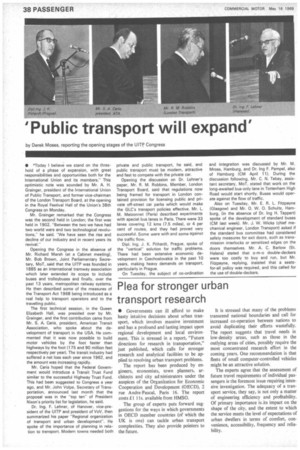'Public transport will expand'
Page 40

If you've noticed an error in this article please click here to report it so we can fix it.
by Derek Moses, reporting the opening stages of the UITP Congress
• "Today I believe we stand on the threshold of a phase of expansion, with great responsibilities and opportunities both for the International Union and its members." This optimistic note was sounded by Mr. A. H. Grainger, president of the International Union of Public Transport, and former vice-chairman of the London Transport Board, at the opening in the Royal Festival Hall of the Union's 38th Congress on Monday.
Mr. Grainger remarked that the Congress was the second held in London; the first was held in 1902. "Between the two we have had two world wars and two technological revolutions," he said. -We have seen the rise and decline of our industry and in recent years its revival."
Opening the Congress in the absence of Mr. Richard Marsh {at a Cabinet meeting), Mr. Bob Brown, Joint Parliamentary Secretary, MoT, said that the UITP was founded in 1335 as an international tramway association which later extended its scope to include buses and trolleybuses and finally, over the past 13 years. metropolitan railway systems. He then described some of the measures of the Transport Act 1968 being introduced as a real help to transport operators and to the travelling public.
The first technical session, in the Queen Elizabeth Hall, was presided over by Mr. Grainger, and the first contribution came from Mr. S. A. Carla, president, American Transit Association, who spoke about the development of transport in the USA. He commented that it was now possible to build motor vehicles by the foot faster than highways by the foot (175 and 90 million feet respectively per year). The transit industry had suffered a net loss each year since 1962, and the amount was increasing rapidly.
Mr. Caria hoped that the Federal Government would introduce a Transit Trust Fund similar to the successful Highway Trust Fund. This had been suggested to Congress a year ago, and Mr. John Volpe, Secretary of Transportation, announced last month that the proposal was in the "top ten" of President Nixon's priority list for legislation, he said.
Dr. lng. F. Lehner, of Hanover, vice-president of the UITP and president of VoV, then summarized his paper -Regional organization of transport and urban development-. He spoke of the importance of planning in relation to transport. Modern towns needed both
private and public transport, he said, and public transport must be modern, attractive and fast to compete with the private car.
Opening the discussion on Dr. Lehner's paper, Mr. R. M. Robbins, Member, London Transport Board, said that regulations now being framed for transport in London contained provision for licensing public and private off-street car parks which would make the GLC's transport policies effective. Mr. L. M. Meizonnet (Paris) described experiments with special bus lanes in Paris. There were 33 lanes covering 12 kms 17.5 miles), Of 4 per cent of routes, and they had proved very successful. Some were with and some against the traffic flow.
Dipl. Ing. J. K. Pithardt, Prague, spoke of the "vertical" solution for traffic problems. There had been extensive economic development in Czechoslovakia in the past 10 years, making heavy demands on transport, particularly in Prague.
On Tuesday, the subject of co-ordination and integration was discussed by Mr. M. Mross, Hamburg, and Dr. Ing F. Pampel, also of Hamburg (CM April 11). During the discussion following, Mr. C. N. Tebay, assistant secretary, MoT, stated that work on the long-awaited bus-only lane in Tottenham High Road would start shortly. Buses would operate against the flow of traffic.
Also on Tuesday, Mr. E. R. L. Fitzpayne (Glasgow) and Mr. 0. W. 0. Schultz, Hamburg, (in the absence of Dr. Ing H. Tappert) spoke of the development of standard buses {CM last week). Mr. J. W. Wicks (chief mechanical engineer, London Transport) asked if the standard bus committee had considered safety measures for exit doors, such as transmission interlocks or sensitized edges on the doors themselves. Mr. A. C. Barlow (St. Helens) stated that o-m-o double-deckers were too costly to buy and run, but Mr. Fitzpayne, replying, insisted that a seatsfor-all policy was required, and this called for the use of double-deckers.






















































































































